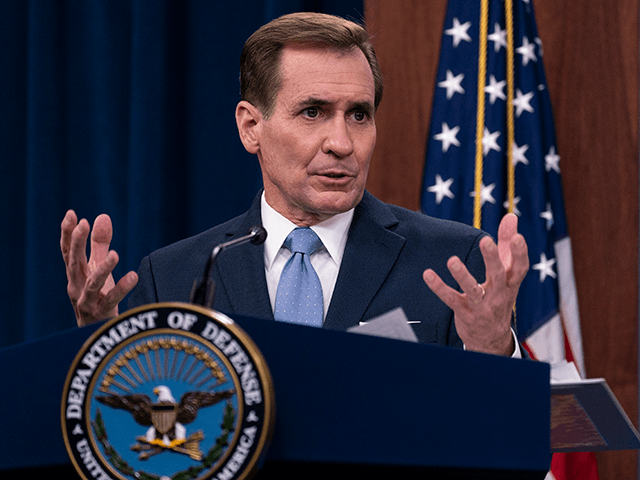The Biden Pentagon indicated recently it may depart from the Trump administration’s peace agreement with the Taliban and leave 2,500 U.S. forces in Afghanistan beyond a negotiated drawdown date of May.
Pentagon chief spokesman John Kirby said Thursday that while the Biden administration is committed to a negotiated settlement, the Taliban is not meeting its commitments under the Trump administration’s negotiated agreement — which would see the drawdown of U.S. forces to zero in Afghanistan by May.
Kirby said at a Pentagon briefing:
We are still involved in trying to get a negotiated settlement. The Taliban have not met their commitments. As you know, there is a looming deadline of early May…but without them meeting our commitments to renounce terrorism and to stop the violent attacks on the Afghan National security forces and by dint of that the Afghan people, it’s very hard to see a specific way forward for the negotiated settlement.
Kirby added that Defense Secretary Lloyd Austin wanted to find “a reasonable rational end to this war and that it’s got to be done through a negotiated settlement,” but did not specify if the end of the war would be through the Trump administration’s agreement.
He noted that the top U.S. commander in Afghanistan, Gen. Scott Miller, and the top U.S. military officer, Chairman of the Joint Chiefs of Staff Army Gen. Mark Milley, believe the current 2,500 U.S. troop presence is the “sufficient number to accomplish” the largely counterterrorism mission in Afghanistan.
Kirby said there has been no decisions by the Biden administration about what the future force presence will look like and warned the Taliban their behavior was making it more difficult for “final decisions” to be made.
“What I’m saying is that any decision of — of force levels in Afghanistan is going to be driven by our security requirements there, our security commitments there, and driven by conditions,” he said.
U.S. troops have been in Afghanistan since late 2001, after terrorist group Al Qaeda leader Osama bin Laden used Afghanistan as a safe haven to plot the September 11, 2001, terrorist attacks in the United States that killed thousands of people.
The U.S. troops’ mission in Afghanistan was to topple the Taliban regime that gave safe haven to bin Laden, and prevent another 9/11-style attack from being planned from Afghanistan.
U.S. forces toppled the regime, but the mission then broadened to training and advising Afghan forces to prevent the Taliban from regaining power in the face of an insurgency. To accomplish the train-and-advise and counterterrorism missions, the U.S. troop presence went from several thousand to approximately 100,000 under the Obama administration.
The Obama administration left with 8,600 U.S. troops in Afghanistan and roughly the same amount of NATO forces. The Trump administration boosted that presence to about 14,000, but after negotiating a peace agreement with the Taliban, drew down to 2,500 by the time it left office.
According to the peace agreement, the U.S. would draw down to zero troops by May if the Taliban agree to refraining from attacks against the U.S. and its allies; not harboring terrorists who intend to harm the U.S. and its allies; and engaging in peace talks with the Afghanistan government.
The Biden administration has said it will review the peace agreement, but Kirby’s comments on Thursday signaled it may not meet the May troop withdrawal deadline based on the assertions the Taliban are not holding up their end of the agreement.
Kirby said:
The Taliban are not meeting their commitments to reduce violence and to renounce their ties to Al Qaida. And they are not meeting their commitments and as long as they’re not meeting their commitments, it’s going to be difficult for anybody at that negotiating table to meet their commitment, in fact, it wouldn’t be the wise course.
I mean, we obviously are still committed to ending this war, but we want to do it in a responsible way. And I don’t think it’s helpful to be drawn now into specific hypothetical discussions about the troop numbers on a — on a specific calendar basis.
However, Kirby left the door open to the possibility of adhering to the peace agreement’s timeline.
“It’s difficult to see how we get there from right where we are now. That doesn’t mean we’re not going to keep trying, doesn’t mean we’re not going to continue to support the efforts of our negotiators. That’s exactly where we want this to go, okay?” he said.
Follow Breitbart News’s Kristina Wong on Twitter or on Facebook.

COMMENTS
Please let us know if you're having issues with commenting.